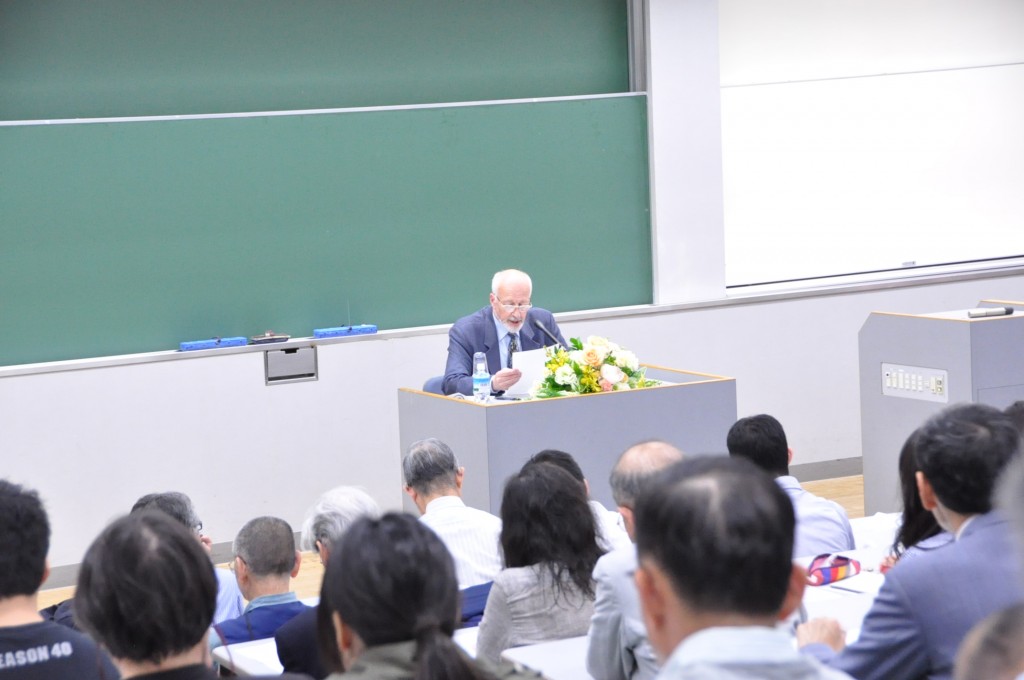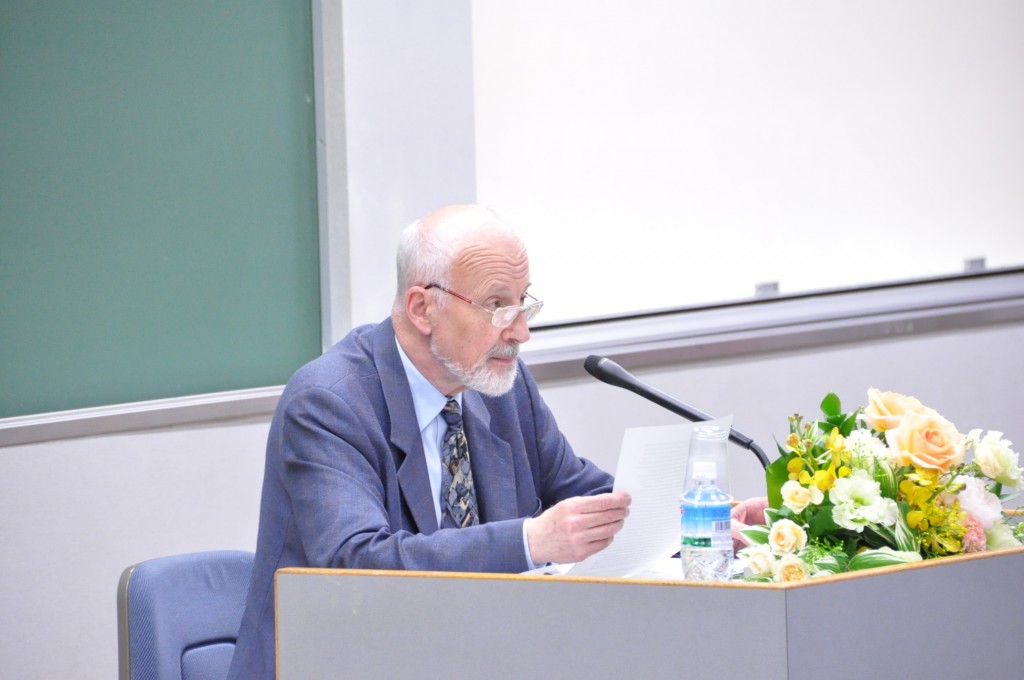Center for Interdisciplinary Study of Monotheistic Religions(CISMOR)Doshisha University
> Public Lectures > Interfaith Dialogue in Europe – Focusing on the Jewish-Christian-Muslim RelationshipsPublic Lectures
Public Lecture by Project1
Interfaith Dialogue in Europe – Focusing on the Jewish-Christian-Muslim Relationships
| Date: |
2011/05/28 13:00 − 15:00 |
|---|---|
| Place: | Room M1, Meitoku-kan 1F, Imadegawa Campus, Doshisha University |
| Lecture: | Rabbi Prof. Jonathan MAGONET, Emeritus Professor, Leo Baeck College |
| Summary: | |
|
Professor Magonet has long been promoting interfaith dialogue among Judaism, Christianity, and Islam. In this lecture, he discussed the situation surrounding Jewish-Christian-Muslim dialogue in Europe, referring to his own experience. The following is a summary of his lecture. In today’s Europe, interfaith dialogue takes place in various forms. The first reason for the increase of such dialogue is the growth of the Muslim population. In the past, European countries identified themselves as Christian nations with ethnic homogeneity. This is no longer the case, as a huge number of Muslim immigrants and refugees have moved and continue to move into Europe. The second reason is secularization. People have become disillusioned with organized religions and have begun seeking new spirituality; while religions, aware of the decline of their influence, have started to explore opportunities for interfaith cooperation. I have lived the typical Jewish life of the 20th century. My family fled from the pogroms to England. I was born in 1942 in South London and grew up in a community of Orthodox Judaism, but my life was not bound by Jewish traditions. This is because by that time, European Jews had discretion to decide whether to observe the Torah or not. In the 19th century, Reform Judaism, Liberal Judaism, Progressive Judaism, and even secular Zionism emerged within the Jewish religious community. Later, the Holocaust and the establishment of the State of Israel caused Jews to undergo further changes. Speaking of myself, I stopped going to synagogue after celebrating my bar mitzvah (the Jewish coming of age ritual) at the age of 13. It was after I joined a group of young Reform Jews that I became aware of my identity as a Jew anew. Later, I entered Leo Baeck College and was determined to become a rabbi. Modern efforts to achieve reconciliation between Jews and Christians date to the late 19th century to the early 20th century. For example, Hermann Cohen and Franz Rosenzweig attempted to interpret the Christian Bible from a Jewish viewpoint. Similar movements also took place among Christians, and some Christians began to voice their opposition to the rise of anti-Semitism. Since the end of World War II, Christians, especially German Christians, have been pressed to reflect on the role that Christianity played in the Holocaust. The World Council of Churches and the Second Vatican Council have also launched a number of projects to correct the anti-Semitic stance held by Christians and to overcome antagonism with Judaism. Martin Buber made mention of the coming of the age of dialogue in 1929. After World War II, the attempt to reconcile Jews and Christians shifted its focus from the unilateral interpretation of these religions to mutual understanding. Since the 1960s, I have been involved in Jewish-Christian Bible Week, organized by Hedwig Dransfeld Haus of Germany. During this week-long event, Jews and Christians come together and participate in the religious services of the each other’s respective religion. Impetus for interfaith dialogue was provided by three catalysts. One is the encounter between Jews and Christians, another is the encounter between Jews and Germany (which sometimes entails a certain degree of sadness), and the other is the Hebrew Bible. The necessity of having dialogue with Muslims was indicated by Leo Baeck already at the end of the 1940s. I, too, have led the Jewish-Christian-Muslim Student Conference, where young believers in these three monotheistic religions meet together to learn about the differences among them through group work. This conference is also designed to address themes relevant to today’s European religious community, such as intergenerational issues, interfaith marriage, and secularism. Today, the importance of dialogue with Islam is felt more strongly than ever. We are required to face Muslims all the more because of the prevalence of the “Clash of Civilizations” theory and because of post-9/11 “Islamophobia.” European Muslims are now feeling conflicted with modern life, which was also the case of Jews in the past. To cope with the situation, Jews opened many rabbinical schools in the West to produce rabbis knowledgeable about both modern Western life and Jewish tradition. A similar movement is taking place among Muslims today—while imams were sent from Muslim nations in the past, the governments of Western countries now extend support to the training of imams. When I took up the office of principal of Leo Baeck College, I invited Christian and Muslim scholars to the college’s faculty. Through these non-Jewish faculty members, our rabbinic discussions are opened externally, enabling us to recognize the similarities and differences among these religions and realize how our truths are perceived by others. In the face of overwhelming destruction, dialogue seems powerless. But without interfaith dialogue, we can never achieve peace. In the workshop following the lecture, a heated discussion took place with the participation of the floor, concerning the change and diversity of modern Judaism seen in rituals, prayers, and translated texts. Shunsuke Sugita (Research Assistant, Graduate Student of School of Theology, Doshisha University) |
|
|
*This lecture will be given in English. *Admission Free, No Reservation Necessary. Co-hosted by: School of Theology, Doshisha University |
|
|
Program (Japanese) |
|

